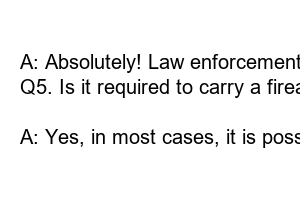경찰이 되는 방법
Title: A Step-by-Step Guide on How to Become a Police Officer
Introduction:
Becoming a police officer is a noble career choice that involves great responsibility and dedication. If you have a passion for serving your community, maintaining law and order, and protecting the innocent, this blog post will provide you with a comprehensive guide on how to become a police officer in English.
1. Meet the Basic Requirements:
To embark on this rewarding career, individuals must first meet certain prerequisites. These may include being at least 18 or 21 years of age, possessing a high school diploma or GED, and having a clean criminal record. *Physical fitness* is also crucial, as police officers often face physically demanding situations.
2. Obtain Relevant Education and Training:
While a college degree is not always mandatory, it can be advantageous to pursue higher education, such as an associate or bachelor’s degree in criminal justice or a related field. Additionally, aspiring police officers must complete a comprehensive training program at a recognized academy to gain the necessary knowledge and skills.
3. Research and Apply for Police Jobs:
Before applying, it is important to research various law enforcement agencies and departments to find the best fit for your career aspirations. Look for job openings, understand their job requirements, and follow the application guidelines diligently. *Submitting a well-crafted resume and cover letter* highlighting your relevant skills, experience, and motivation is crucial for a successful application.
4. Ace the Selection Process:
The selection process for aspiring police officers is rigorous and typically entails a series of assessments, including written exams, physical fitness tests, interviews, and background checks. *Thoroughly preparing for each stage* through practice tests, mock interviews, and physical training will increase your chances of success.
5. Complete the Police Academy:
Upon acceptance, individuals must complete the police academy training, which includes classroom sessions, practical exercises, and drills. It covers a wide range of topics, including criminal law, self-defense tactics, firearms training, emergency response, and community policing. *Staying focused, disciplined, and actively participating during the academy* is crucial for success.
6. Continue Learning and Advancement:
Becoming a police officer is just the beginning. To ensure effectiveness throughout your career, continuous learning and skill development are essential. Engage in ongoing training opportunities, attend workshops/seminars, and keep up with the latest advancements in the field. Gaining specialized certifications or pursuing advanced degrees can also open doors for career advancement within law enforcement.
Summary:
Becoming a police officer requires meeting basic requirements, obtaining relevant education and training, researching and applying for jobs, acing the selection process, completing the police academy, and continually striving for professional growth. By following this step-by-step guide, you can pursue your dream of wearing the badge and making a positive impact in your community.
FAQs:
Q1. How long does it take to become a police officer?
A: The duration can vary but typically ranges from six months to one year to complete the necessary education and training requirements.
Q2. Can individuals with past criminal records become police officers?
A: It largely depends on the nature of the offense and how long ago it occurred. Different agencies have different policies regarding this matter.
Q3. Is there a maximum age limit to become a police officer?
A: Many police departments have an upper age limit, typically around 35-40 years. However, some agencies may provide waivers for military veterans.
Q4. Can women become police officers?
A: Absolutely! Law enforcement encourages diversity, and women are actively recruited and welcomed into the police force.
Q5. Is it required to carry a firearm as a police officer?
A: Depending on the jurisdiction, police officers may be required to carry firearms for their own safety and the safety of the community, but this is not universal.
Q6. Can you transfer between different police departments?
A: Yes, in most cases, it is possible to transfer between police departments, but it depends on the specific policies and requirements of each agency.

